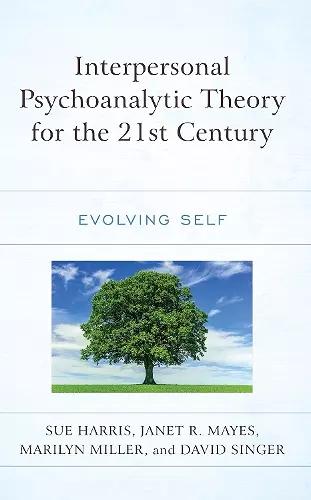Interpersonal Psychoanalytic Theory for the 21st Century
Evolving Self
Sue Harris author Marilyn Miller author David Singer author Janet R Mayes author
Format:Hardback
Publisher:Lexington Books
Published:30th Jan '23
Should be back in stock very soon

Interpersonal psychoanalytic theory states that people can achieve insight into how, through interactions with people, they became who they are, and how they can change patterns of living that limit further satisfaction. People are born with a blueprint for growth and development that includes self-respect, joy, expansion of experiences, creativity, and ever widening and deepening human interactions. With some exceptions, the mental health profession in the United States is dictated by insurance and pharmaceutical companies, focusing primarily on symptom reduction and social conformity. These goals are inadequate. The goal, as elucidated in this book, is maximizing one's human potential. Interpersonal Psychoanalytic Theory for the 21st Century: Evolving Self is written for practitioners in all areas of mental health and pedagogy, whether or not they are psychotherapists or clinicians. It is also intended for anyone interested in understanding themselves and other people. Additionally, in the spirit of Harry Stack Sullivan, developer of the theory, this volume addresses some pressing issues relevant to interpersonal theory and practice in the twenty-first century social/economic/political milieu.
Interpersonal Psychoanalytic Theory for the 21st Century: Evolving Self presents a refreshing and welcome expansion of the psychological perspective in order to understand an individual’s behavior and emotions within the context of their interpersonal relationships. Where we are and where we are going in the journey of life depends so much on where we have been and with whom we have traveled and interacted. Our 'self' as a static entity is an abstraction that obscures the dynamic essence of all of nature, including personality. This important work provides theoretical insights that will help non-clinicians as well as clinicians understand individuals in the context of personal, social, and historical development. As a public health researcher with an interest in the intersection of health and public policy, I found this book well worth the read!
-- Hillel W. Cohen, Albert Einstein College of MedicineAs a clinical psychologist/psychotherapist who entered this field because I was inspired by the liberating psychoanalytic concepts developed by F. Fromm-Reichmann, H.S. Sullivan, R.D. Laing, and other theoreticians and practitioners of long-term psychoanalytically oriented psychotherapy, I welcome this book. It challenges the ‘quick fix’ approaches of the past 30-plus years, fostered, as the authors correctly demonstrate, by the insurance and pharmaceutical industries and other social/political realities. There is little inclination toward a long-term treatment process that can identify and correct maladaptive ways of relating to others. Relying on a developmental analysis of where ‘problems in living,’ begin with ‘case’ history examples, the authors remind us of what is possible and necessary if we are to truly help people heal some of the damage done in non-empathic child rearing. It is for those interested in the liberating potential of psychotherapy and self-study we rarely hear about in popular or professional discourse.
-- Suzanne Ross, clinical psychologist in private practiceI am a practicing psychiatrist at a teaching hospital and was fortunate and grateful to receive an advance copy of this book. It captures the core concepts of interpersonal psychoanalytic theory with much clarity and depth. There is no pontification here. This is a very practical and engaging book. I have used it to teach a course on the theory to psychiatry residents with much positive feedback. The residents have remarked: ‘This makes so much sense. You mean this is all one theory? We don’t have to use various theories depending on the case?’; ‘I see how their history is connected to their current problems.’ This book has distilled the concepts of interpersonal theory and made them clear, digestible and useful. Aiming to educate therapists and non-therapists alike, it accomplishes both goals with ease, no easy feat for a book on psychoanalysis.
-- Namratha Boda, attending psychiatrist, Maimonides Medical CenterThis book provides tools that have been easy to integrate with my current practice. Thus far, I have been able to broaden the scope of therapeutic inquiry through the use of intentional and specific questions that help drive sessions while generating space to learn much more about my client and their experiences. I look forward to utilizing this book as a tool to further expand my work.
-- Dani T., staff psychotherapist at a community mental health clinicThe humanist premise of this accessible and substantial book is that you are never too young or too old to grow emotionally, intellectually, socially, and spiritually. The underpinning of Interpersonal Psychoanalytic Theory sounds obvious: people are raised by other people. But in the current pharmaceutically dominated approach to treating mental distress and/or disorders, re-interpreting this system for the twenty-first century is a horizon-expanding contribution to lay readers and re-grounding for professionals. One of the most attractive features of the book is that the chapters cover development stages from womb to adulthood. Yes, there is a summary of cutting-edge research into development in the womb! For my community, LGBTQIA+, there is a chapter and several case histories oriented to the additional stresses members of the community experience. The authors have long experience working with patients. The writing is always clear yet offers copious academic citations.
-- Loretta Goldberg, author of The Reversible Mask: An Elizabethan Spy NISBN: 9781666927504
Dimensions: 238mm x 159mm x 27mm
Weight: 635g
334 pages